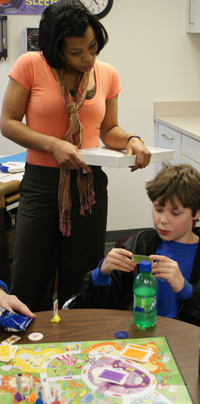 |
Tawanda Mercer, a mental health nurse practitioner student in the College of Nursing, observes as a young boy plays a board game with his peers at social skills group therapy on a recent Monday afternoon. |
“Children and teens with autism often have difficulty with peer-to-peer interactions,” said Terri Mathews, Ph.D., a psychologist and assistant professor with the Munroe-Meyer Institute. “The best treatment for this is to provide them with intense social skills training.”
That’s exactly what Dr. Mathews and Lezlee Greguson, Ph.D., a research associate at MMI, do on Monday afternoons in the Munroe-Meyer Diagnositc Center on Saddle Creek Road. The program is partially supported by the Munroe-Meyer Guild.
“A few schools may offer social skills training, but it is largely unavailable for most children who need it,” Dr. Mathews said. “We are using a behavioral model that emphasizes meeting specific criteria, such as paying a detailed compliment.
“The children are given homework and expected to practice what they’ve learned in the group at home.”
|
One boy drew a card that read: “Name someone who helps you to be brave.” His response: “People who serve overseas in Iraq.” His fellow players gave his answer a thumbs-up and awarded him a ticket to the next attraction on the board.
The game portion of the class continued for the next 45 minutes as behavioral therapists documented the amount of times the boys applied their S.C.O.R.E. skills.
S.C.O.R.E. stands for sharing ideas, complimenting others, offering help, recommending changes and exercising self-control.
The participants in the group have all been diagnosed with high-functioning autism, Asperger’s disorder or ADHD. Still, it doesn’t make it any easier for them to be patient with their peers.
That’s why the therapists constantly dole out praise and positive reinforcement for good interactions and exchanges.
At the conclusion of the game, Dr. Mathews transforms the room into a class-like setting.
This day’s lesson: how to know when you might be talking too much about one topic, which is a frequent issue for children and teens with autism.
Dr. Mathews asked the class for potential cues from others that might indicate when to stop talking about a certain topic.
“When they put their hands on their ears,” one boy yelled.
The class laughed.
“When they start to shift in their seat,” another boy said.
Dr. Mathews used role play with another therapist to demonstrate. She rambled on about a hockey game while Tamara Newcomb, Ph.D., clinical psychologist at MMI, looked uninterested.
Afterwards, Dr. Mathews asked the boys to evaluate the exchange and practice role-playing with each other.
The hope is that the children will improve their verbal as well as nonverbal communication skills, such as eye contact, appropriate voice tone and pleasant facial expression, through practice.
The groups meet weekly for eight weeks. A previous group of adolescents that took part in the sessions showed noticeable improvement after eight weeks.
“I think one of the best, most exciting things about the previous group was that they wanted to continue to meet after the eight weeks were over to maintain the relationships they developed,” Dr. Mathews said. “They had found the class to be a safe and comfortable environment where they all felt accepted, which is wonderful for children who might not have any other opportunities for social activities.”